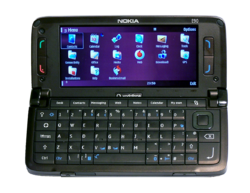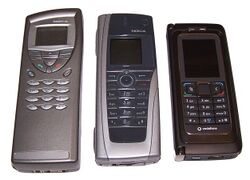Engineering:Nokia E90 Communicator
 | |
| Compatible networks | WCDMA 2100 HSDPA GSM 850/900/1800/1900 |
|---|---|
| Predecessor | Nokia 9500 Communicator |
| Successor | Nokia N97 Nokia E75 Nokia E7-00 |
| Dimensions | 132 × 57 × 20 mm |
| Mass | 210 g |
| Memory | 256 MB Internal NAND flash 128 MB RAM (80–90 MB user accessible) |
| Display | Main display: 800 × 352 pixels, 4-inch, with 16.7 million colours Cover display: 240 × 320 pixels, 2 inch, with 16 million colours |
| Connectivity | Bluetooth 2.0 USB 2.0 Compliant Wi-Fi IrDA |

thumb

Nokia E90 Communicator is a high-end 3G mobile phone from Nokia, the fifth generation and final Communicator, also part of the Eseries. It was announced on 11 February 2007 at the 3GSM show in Barcelona. It succeeded the Nokia 9500 Communicator as the company's flagship business-oriented device. Its clamshell form and design are reminiscent of older palmtop computers.
Unlike its predecessors, the E90 runs on the S60 platform of Symbian OS (3rd Edition Feature Pack 1 and v9.2 respectively). Previous Communicators meanwhile have been based on either GeOS or Symbian-based Series 80. The move to the common S60 was essential for software compatibility, but it did get rid of some exclusive Series 80 UI behaviours. The E90 is also the first Communicator to have UMTS/HSDPA connectivity and integrated GPS. It features OSGi and eRCP, Eclipse RCP for embedded systems.
The first Nokia E90 unit was sold in an auction in Jakarta, Indonesia on 17 May 2007 for Rp. 45,000,000 (5,000 US$), which was sold to Hartono Gunawan, a Indonesian businessman.[1] Indonesia being one of the largest market share for Nokia's communicator series is cited as a reason for the unit's first launch location.[2]
Early user-feedback and reviews highlighted a defect in the microphone of the Communicator. Nokia initially denied the existence of the defect, but Nokia Europe later acknowledged it in the Q3 earnings report released on 18 October 2007,[3] and stated that the issue had been fully resolved.
The replacement of the QWERTY-ridden interface of Series 80 with the S60 software, which is designed to be used with one thumb, was criticised by some people.[4][5]
The Communicator's firmware version 7.40.1.2, released in late October 2007, added support for A-GPS and improved GPS performance. This version also upgraded the Maps application. As of June 2009[update], the Communicator's most recent firmware version is 400.34.93. The free navigation program Ovi Maps is also available for this Communicator (currently just without the free navigation itself).
Specification sheet
(Source )
| Platform | |
|---|---|
| Operating System | Symbian OS v9.2 S60 Platform, 3rd Edition, Feature Pack 1 |
| CPU | ARM11 (OMAP2420 @ 330 MHz) |
| RAM (built in) | 128 MB shared |
| Expandable memory | Originally stated as 2 GB maximum- this has now been changed to 4 GB on the Nokia website specifications. microSD/microSDHC hot-swappable [1] [2]. However, 16 GB has been observed to work [3]. Tested working with 32 GB |
| Phone Features | |
| Messaging | SMS, MMS, Email (IMAP4, POP3, SMTP), Instant Messaging |
| Voice Recognition | Yes |
| Speakerphone | Yes |
| Video calls | Yes (QCIF camera) |
| Push to talk | Yes |
| Vibration | Yes |
| Call log | Yes (maximum of 30 days) |
| Connectivity | |
| GSM | Yes (Quadband 850/900/1800/1900 MHz) |
| CDMA | Yes (WCDMA 2100 MHz with simultaneous voice and packet data) |
| 3G | Yes (UMTS 2100 with HSDPA of 3.6 Mbit/s). |
| GPRS | Yes |
| EDGE | Yes |
| WLAN | Yes (Wi-Fi 802.11b/g) |
| VOIP | Yes |
| GPS | Yes (integrated) |
| FM radio | Yes (requires included headset) |
| Bluetooth | Yes (v2.0 with Enhanced Data Rate & A2DP) |
| Infrared | Yes |
| USB | Yes (v2.0 miniUSB) |
| Fax | No |
| BlackBerry | Yes (with BlackBerry Connect v4.0 Software, including over the air activation) |
| Misc. | |
| Offline mode | Yes, However Bluetooth and WiFi may be switched on independently. |
| Office Suite | Quickoffice (Microsoft Office compatible) |
| Web browser | WAP 2.0, xHTML, HTML (limited Adobe Flash support) |
| Java support | Yes (MIDP 2.0, CLDC 1.1) |
| PDF viewer | Yes (Adobe Acrobat Reader LE 1.5.0) |
| GPS Integration |
|
| Camera | 3.2 megapixels (with autofocus and LED flash), video at (up to) VGA (640 × 480), up to 30 frame/s |
| Video player | Yes (built-in RealPlayer) |
| Displays | |
| Exterior screen | TFT, 16M colours, 240 × 320 pixels, 2 inch |
| Internal screen | TFT, 16.7M colours, 800 × 352 pixels, 4 inch |
| Battery | |
| Removable battery | Yes |
| Battery Type | BP-4L, Li-Ion 1500 mAh |
| Stand-by time | Up to 14 days |
| Talk time | Up to 5.8 hours |
| Physical | |
| Form factor | Clamshell with full QWERTY keyboard |
| Dimensions | 132 × 57 × 20 mm |
| Weight | 210 gram |
- The Nokia E90 does not support fax as fax services are not included in the 3G Specifications. It does however support fax through Content Beamer application.
- Supports Microsoft Exchange email via the Nokia "Mail for Exchange" software application. This program does not support folders or native HTML mail.
References
- ↑ "The First Nokia E90 Communicator Sold – SlashPhone.com". http://www.slashphone.com/87/7239.html.
- ↑ Ringing Up Sales in Indonesia – WSJ.com
- ↑ Nokia Q32007 Earnings Call Transcript – Seeking Alpha
- ↑ "Nokia E90 Communicator reviewed". 12 February 2007. https://www.engadget.com/2007/02/12/nokia-e90-communicator-reviewed/.
- ↑ "Nokia's New Coke moment?". https://www.theregister.co.uk/2007/08/02/nokia_new_coke/.
External links
- Official Nokia E90 page
- Forum Nokia Specifications
- Nokia Press Release – 12 February 2007.
- Latest Nokia Maps application and Map Loader utility
- Beta release of contact-threaded SMS/MMS text messaging application for E90 – and others
 |
